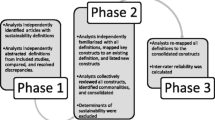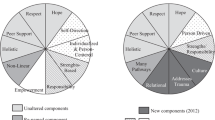Abstract
In the decades of the 1990s many mental health programs and the systems that fund these programs have identified themselves as recovery-oriented. A program that is grounded in a vision of recovery is based on the notion that a majority of people can grow beyond the catastrophe of a severe mental illness and lead a meaningful life in their own community. First person accounts of recovery and empirical research have led to a developing consensus about the service delivery values underlying recovery. The emphasis on recovery-oriented programming has been concurrent with a focus in the field on evidence-based practices. We propose that evidence based practices be implemented in a manner that is recovery compatible. Program dimensions for evidence based practice, such as program mission, policies, procedures, record keeping and staffing should be consistent with recovery values in order for a program to be considered to be recovery-oriented. This article describes the critical dimensions of such value based practice, regardless of the service the recovery oriented mental health programs provide (e.g., treatment, case management, rehabilitation). The aim of this first attempt at conceptualizing recovery-oriented mental health programs is to both provide direction to those involved in program implementation of evidence based mental health practices, as well as providing a stimulus for further discussion in the field.
Similar content being viewed by others
References
J. A. Alexander R. Lichtenstein T. A. Daunno R. McCormick N. Muramatsu E. Ullman (1997) ArticleTitleDeterminants of mental health providers’ expectations of patients’ improvement Psychiatric Services 48 IssueID5 671–677 Occurrence Handle1:STN:280:DyaK2s3ptVSgtQ%3D%3D Occurrence Handle9144822
W. A. Anthony (1993) ArticleTitleRecovery from mental illness: The guiding vision of the mental health service system in the 1990s Psychosocial Rehabilitation Journal 16 IssueID4 11–23
Anthony, W. A. (2001). The need for recovery-compatible evidence based practices. Mental Health Weekly, November 5, p. 5
W. A. Anthony M. R. Cohen M. Farkas C. Gagne (2002) Psychiatric rehabilitation Center for Psychiatric Rehabilitation Boston, MA
W. A. Anthony E. S. Rogers M. Farkas (2003) ArticleTitleEvidence based practice in mental health Community Mental Health Journal 39 101–114 Occurrence Handle10.1023/A:1022601619482 Occurrence Handle12723845
T. BealeV. Lambric (1995) The recovery concept: Implementation in the mental health system (Report by the Community Support Program Advisory Committee) Ohio Department of Mental Health Columbus OH
J. H. Beard R. N. Propst T. J. Malamud (1982) ArticleTitleThe Fountain House model of psychiatric rehabilitation Psychosocial Rehabilitation Journal 5 IssueID1 47–53
D. R. Becker R. E. Drake A. Farabaugh G. R. Bond (1996) ArticleTitleJob preferences of clients with severe psychiatric disorders participating in supported employment programs Psychiatric Services 47 IssueID11 1223–1226 Occurrence Handle1:STN:280:DyaK2s%2FntlGitA%3D%3D Occurrence Handle8916240
M. Bell P. Lysaker (1996) ArticleTitleLevels of expectation for work activity in schizophrenia: Clinical and rehabilitation outcomes Psychiatric Rehabilitation Journal 19 IssueID3 71–76
Blackwell, B., Eiders, K., Robinson, D. (2000). The consumer’s role in assessing quality. In G. Stricker W. Troy (Eds.), Handbook of quality management in behavioral health: Issues in the practice of psychology.
G. R. Bond D. R. Becker R. E. Drake C. A. Rapp N. Meisler A. F. Lehman M. D. Bell C. R. Blyler (2001) ArticleTitleImplementing supported employment as an evidence-based practice Psychiatric Services 52 IssueID3 313–322 Occurrence Handle10.1176/appi.ps.52.3.313 Occurrence Handle1:STN:280:DC%2BD3M3lvFWgtA%3D%3D Occurrence Handle11239097
J. Campbell R. Schraiber (1989) In pursuit of wellness: The well-being project: Mental health clients speak for themselves California Department of Mental Health Sacramento CA
P. J. Carling (1995) Return to community: Building support systems for people with psychiatric disabilities The Guilford Press New York
J. S. DavidsonL. Strauss (1992) ArticleTitleSense of self in recovery from severe mental illness British Journal of Medical Psychology 65 IssueID2 131–145 Occurrence Handle1633118
P. E. Deegan (1990) ArticleTitleSpirit breaking: When the helping professions hurt Humanistic Psychologist 18 IssueID3 301–313 Occurrence Handle10.1080/08873267.1990.9976897
P. E. Deegan (1993) ArticleTitleRecovering our sense of value after being labeled Journal of Psychosocial Nursing and Mental Health 31 IssueID4 7–11 Occurrence Handle1:STN:280:DyaK3s3ltlKrtA%3D%3D
R. E. Drake H. H. Goldman H. S. Leff A. F. Lehman L. Dixon K. T. Mueser W. C. Torrey (2001) ArticleTitleImplementing evidence-based practices in routine mental health service settings Psychiatric Services 52 IssueID2 179–182 Occurrence Handle10.1176/appi.ps.52.2.179 Occurrence Handle1:STN:280:DC%2BD3M3isVCisw%3D%3D Occurrence Handle11157115
Farkas, M. D., Anthony, W. A., & Cohen, M. R. (1989). An overview of psychiatric rehabilitation: The approach and its programs. In M. D. Farkas & W. A. Anthony (Eds.), Psychiatric programs: Putting theory into practice. Baltimore, MD: Johns Hopkins University Press.
M. Farkas M. Cohen P. Nemec (1988) ArticleTitlePsychiatric rehabilitation programs: Putting concepts into practice Community Mental Health Journal 24 IssueID1 7–21 Occurrence Handle10.1007/BF00755049 Occurrence Handle1:STN:280:DyaL1c3isVSrtQ%3D%3D Occurrence Handle3370939
M. Farkas C. Gagne W. A. Anthony (2001) ArticleTitleRecovery and rehabilitation: A paradigm for the new millennium La rehabilitacio psicosocial integral a la comunitat i amb la communitat 1 IssueID7/8 13–16
Fisher, D. Ahern, L. (1999, Spring). People can recover from mental illness. National Empowerment Center Newsletter, 8–9. Lawrence, MA.
F. J. Frese J. Stanley K. Kress S. Vogel-Scibilia (2001) ArticleTitleIntegrating evidence-based practices and the recovery model Psychiatric Services 52 IssueID11 1462–1468 Occurrence Handle10.1176/appi.ps.52.11.1462 Occurrence Handle11684741
C. Glisson A. Hemmelgarn (1998) ArticleTitleThe effects of organizational climate and interorganizational coordination on the quality and outcomes of children’s service systems Child Abuse and Neglect 22 IssueID5 401–421 Occurrence Handle10.1016/S0145-2134(98)00005-2 Occurrence Handle1:STN:280:DyaK1c3psVOisQ%3D%3D Occurrence Handle9631252
Harding, C. M. (in press). Overcoming the persistent resistance of clinicians to ideas of recovery in serious mental illness. In P. Ridgway P. Deegan (Eds.), Deepening the mental health recovery paradigm: Defining implications for practice. Lawrence, Kansas: University of Kansas Press.
C. Harding J. Zahniser (1994) ArticleTitleEmpirical correction of seven myths about schizophrenia with implications for treatment Acta Psychiatrica Scandinavica Supplementum 90 IssueIDSuppl 384 140–146
Institute of Medicine Committee on Quality of Health Care in America (2001). Crossing the Quality Chasm: A new Health System for the 21st Century. Washington, DC: National Academies Press.
N. Jacobson L. Curtis (2000) ArticleTitleRecovery as policy in mental health services: Strategies emerging from the states Psychiatric Rehabilitation Journal 23 IssueID4 333–341
N. Jacobson D. Greenley (2001) ArticleTitleA conceptual model and explication Psychiatric Services 52 IssueID4 482–485 Occurrence Handle10.1176/appi.ps.52.4.482 Occurrence Handle1:STN:280:DC%2BD3M7oslOrtg%3D%3D Occurrence Handle11274493
Kramer, P. J., Gagne, C. A. (1997). Barriers to recovery and empowerment for people with psychiatric disabilities. In L. Spaniol, C. Gagne, M. Koehler (Eds.), The psychological and social aspects of psychiatric disability. Boston, MA: Center for Psychiatric Rehabilitation.
Lapsley, H., Waimarie Nikora, L., Black, R. (2002). Kia Mauri Tau! Narratives of Recovery from Disabling Mental Health Problems. University of Waikato Mental Health Narratives Project.
R. K. Majumder R. T. Walls S. L. Fullmer (1998) ArticleTitleRehabilitation client involvement in employment decisions Rehabilitation Counseling Bulletin 42 IssueID2 162–173
R. Mayer I. Schoorman (1992) ArticleTitlePredicting participation and production outcomes through a two dimensional model of organizational commitment Academy of Management Journal 35 671–684
McQuillan, B. (1994). My life with schizophrenia. In L. Spaniol M. Koehler (Eds.), The experience of recovery. Boston, MA: Center for Psychiatric Rehabilitation.
S. Mead M. E. Copeland (2000) ArticleTitleWhat recovery means to us: Consumers’ perspective Community Mental Health Journal 36 IssueID3 315–328 Occurrence Handle10.1023/A:1001917516869 Occurrence Handle1:STN:280:DC%2BD3M%2FksFGgsA%3D%3D Occurrence Handle10933247
J. Pyke J. Lancaster J. Pritchard (1997) ArticleTitleTraining for partnership Psychiatric Rehabilitation Journal 21 IssueID1 64–66
Ralph, R. O., Lambric, T. M., Steele, R. B. (1996). Recovery Issues in a consumer developed evaluation of the mental health system. Presentation at 6th Annual Mental Health Services Research and Evaluation Conference, Arlington, VA, February, pp.1–13
P. Ridgway (2001) ArticleTitleReStorying psychiatric disability: Learning from first person recovery narratives Psychiatric Rehabilitation Journal 24 IssueID4 335–343 Occurrence Handle1:STN:280:DC%2BD3MzksVegug%3D%3D Occurrence Handle11406984
W. C. Sanderson (2002) ArticleTitleComment on Hansen et al: Would the results be the same if patients were receiving an evidence-based treatment? Clinical Psychology Science and Practice 9 IssueID3 350–352 Occurrence Handle10.1093/clipsy/9.3.350
Spaniol, L., Gagne, C., & Koehler, M. (1999). Recovery from serious mental illness: What it is and how to support people in their recovery. In R. P. Marinelli & A. E. Dell Orto (Eds.), The psychological and social impact of disability (4th ed.). New York: Springer Publishing.
L. Spaniol C. Gagne et al. (2003) The recovery framework in rehabilitation: Concepts and practices from the field of serious mental illness J. R. Finch D. Moxley (Eds) Sourcebook of rehabilitation and mental health services. Plenum New York 37–50
L. Spaniol N. Wewiorsky C. Gagne W. A. Anthony (2002) ArticleTitleThe process of recovery from schizophrenia International Review of psychiatry 14 327–336 Occurrence Handle10.1080/0954026021000016978
State of Wisconsin Blue Ribbon Commission on Mental Health (1997). [On-line], Available: http://www.dhfs.state.wi.us/MH_BCMH/bluerib.htm.
W. P. Sullivan (1994) ArticleTitleA long and winding road: The process of recovery from severe mental illness Innovations and Research 3 IssueID3 19–27
The Presidents New Freedom Commission on Mental Health (2003). Achieving the Promise: Transforming Mental Health Care in America. Final Report.
A. K. Torgalsboen B. R. Rund (1998) ArticleTitleFull recovery from schizophrenia in the long term: A ten-year follow-up of eight former schizophrenic patients Psychiatry: Interpersonal and Biological Processes 61 IssueID1 20–34 Occurrence Handle1:STN:280:DyaK1c3lsl2nuw%3D%3D
W. C. Torrey R. E. Drake L. Dixon B. J. Burns L. Flynn A. J. Rush R. E. Clark D. Klatzker (2001) ArticleTitleImplementing evidence-based practices for persons with severe mental illnesses Psychiatric Services 52 IssueID1 45–50 Occurrence Handle10.1176/appi.ps.52.1.45 Occurrence Handle1:STN:280:DC%2BD3M7itVagsA%3D%3D Occurrence Handle11141527
R. Unzincker (1989) ArticleTitleOn my own: A personal journey through madness and re-emergence Psychosocial Rehabilitation Journal 13 IssueID1 71–77
R. Weingarten (1994) ArticleTitleThe ongoing process of recovery Psychiatry 57 369–375 Occurrence Handle1:STN:280:DyaK2M3gslChtA%3D%3D Occurrence Handle7899530
S. L. Young D. S. Ensing (1999) ArticleTitleExploring recovery from the perspective of people with psychiatric disabilities Psychiatric Rehabilitation Journal 22 IssueID3 219–231
Author information
Authors and Affiliations
Corresponding author
Additional information
The development of this paper was supported in part by the National Institute of Mental Health, Rehabilitation and Health Services Research of Serious Mental Disorder Research Program, #5R24MH57933.
Rights and permissions
About this article
Cite this article
Farkas, M., Gagne, C., Anthony, W. et al. Implementing Recovery Oriented Evidence Based Programs: Identifying the Critical Dimensions. Community Ment Health J 41, 141–158 (2005). https://doi.org/10.1007/s10597-005-2649-6
Issue Date:
DOI: https://doi.org/10.1007/s10597-005-2649-6




